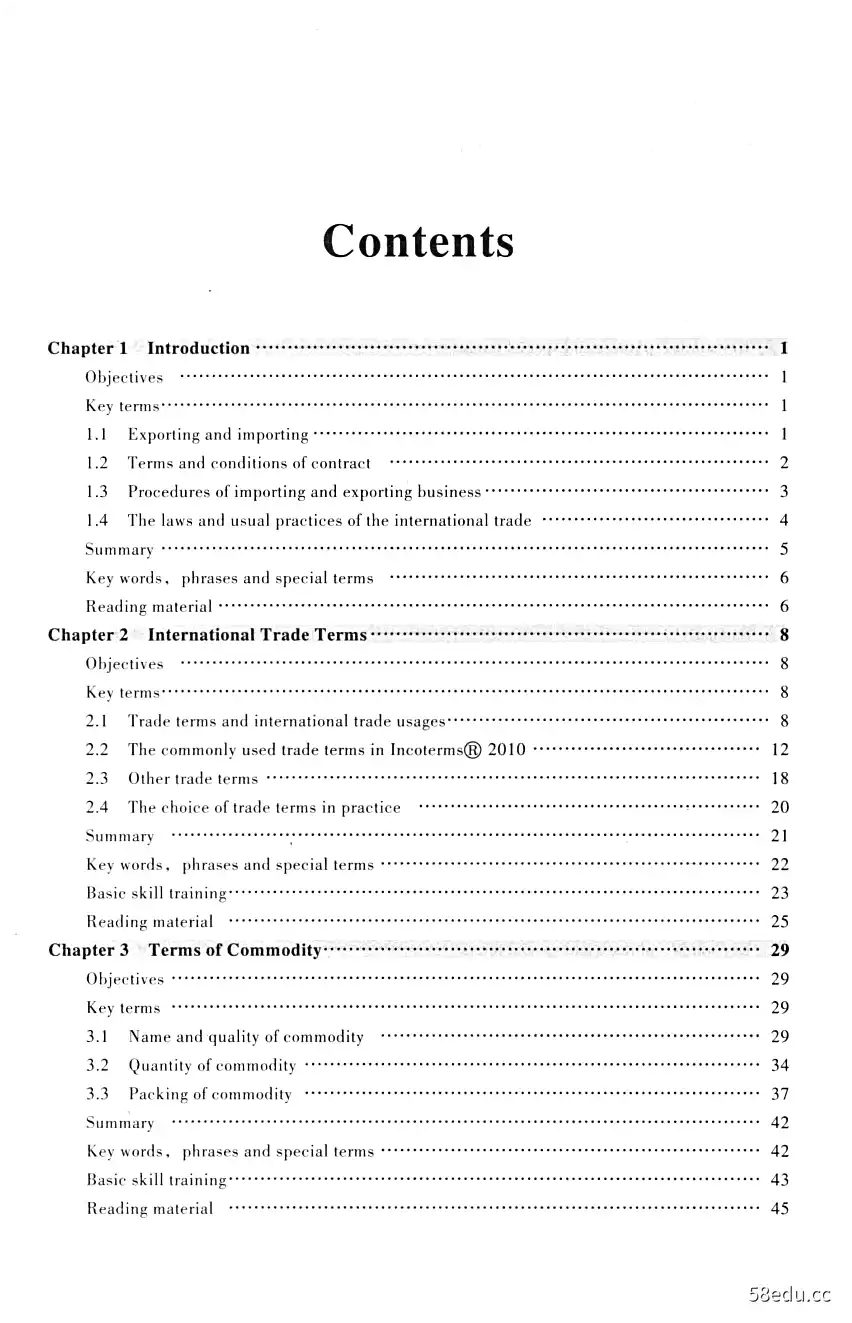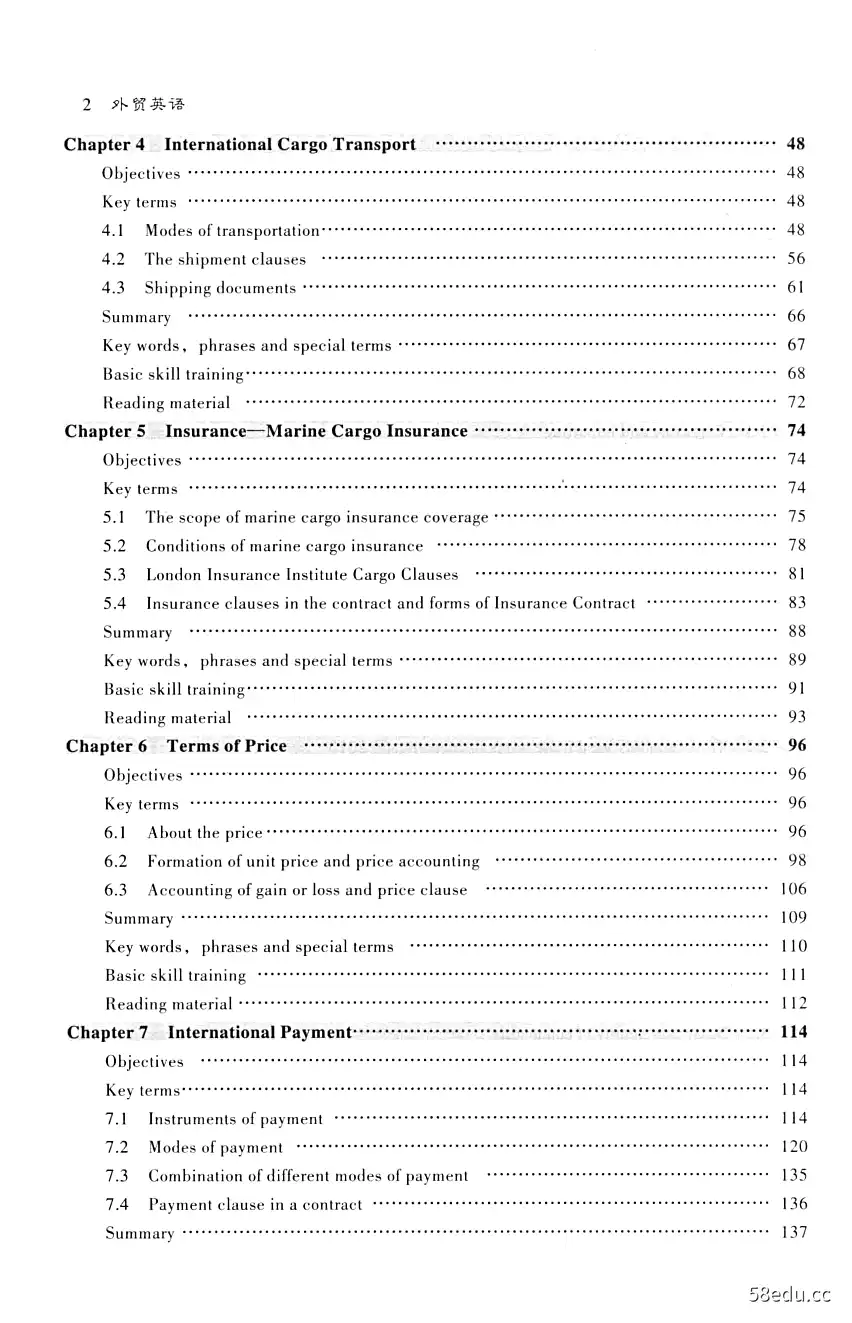《外贸英语 第3版》吕长春主审;郝美彦主编;朱丽萍副主编|(epub+azw3+mobi+pdf)电子书下载
图书名称:《外贸英语 第3版》
- 【作 者】吕长春主审;郝美彦主编;朱丽萍副主编
- 【丛书名】21世纪高职高专精品教材·经济贸易类
- 【页 数】 251
- 【出版社】 沈阳:东北财经大学出版社 , 2016.02
- 【ISBN号】978-7-5654-2247-8
- 【参考文献】 吕长春主审;郝美彦主编;朱丽萍副主编. 外贸英语 第3版. 沈阳:东北财经大学出版社, 2016.02.
图书封面:
图书目录:


《外贸英语 第3版》内容提要:
本书共分为12章,每章设有学习目标、课堂讨论、专业术语练习、本章小结、关键词汇、配套练习题等相关资料,语言浅显易懂,为正文提供参考答案及参考译文。本书不仅可以作为各高校国际贸易、商务英语等专业的双语教学材料,也可作为专业外语课的教材。
《外贸英语 第3版》内容试读
Chapter 1
Introduction
Objectives
After studying this chapter,you should be able to
1.explain what foreign trade is.
2.list some forms of international trade.
3.list the contents of contract for the international sales of the goods.
4.describe procedure of exporting business.
5.describe procedure of importing business.
6.grasp some important international trade usages.
Key terms
Domestic trade
Foreign trade
Monetary conversion
Importing business
Exporting business
Performing contract
Negotiating contract
Foreign trade is the activity that one country and region exchange goods and services withother countries and regions.From the viewpoint of one country,this exchange activity is calledforeign trade;seen from the international scope,it is called international trade,world trade oroverseas trade.Foreign trade includes import and export operations.When dealing in importingand exporting,businessmen will face a variety of conditions that differ from those to which theyhave got used in domestic trade.The fact that the transactions are across national bordershighlights the differences between domestic and international trade.Generally,there are certaindifferences that justify the separate treatment of international trade and domestic trade.Inparticular,these differences include cultural problems,monetary conversion,trade barriers,laws and regulations,etc.Foreign traders must be aware of these differences because they oftenbring about troubles in international trade.
1.1 Exporting and importing
Exporting is the simplest way to enter a foreign market.There are two types of exporting:
2外贸英语
direct exporting and indirect exporting.Direct exporting involves establishing an exportdepartment or even an overseas sales branch.It provides a continuous presence and easier controlfor the exporter in the buyer's country but obviously means more expenses.A company can alsosell its products abroad indirectly through middlemen commonly called export agents.Exportagents seldom produce goods by themselves.Their purpose is to bring together buyers and sellersand help them handle international transactions.They make their money as a commission of thesale price.Many agents specialize in specific kinds of products.The principal advantage of usingan export agent is that the company does not have to deal with foreign currencies or red tape ofinternational market.The major disadvantage is that because the export agent must make a profit,the price of the product must be increased or the domestic company must provide a larger discountthan it would in domestic market transaction.Indirect exporting involves less investment and istherefore less risky,which enable small firms with limited capital and product diversification canexport easily.
Importing is the process of purchasing goods and services from other nations.Likeexporting,importing can be either indirect or direct.Direct importing is the direct purchase ofgoods from overseas market,while indirect importing is the purchase of goods through domesticmiddlemen.Indirect importing is convenient but limited in selection of goods and less profit.
Direct importing is economical but more complicated than buying from importing middlemen.
In addition to the above-mentioned importing and exporting,according to market situation,trading conditions and trade practices,other international trade forms can be used,such asdistribution,invitation for bids,counter trade,future trading,processing and assemblingtrade.These modes of international trade may be adopted flexibly.
1.2 Terms and conditions of contract
In import and export business,the seller and the buyer conclude a deal through negotiation.
Contract for the international sales of goods stipulates obligations and rights of two parties.Acomplete and definite contract can help to realize two parties'purpose and avoid disputes betweenthem.As to the terms and conditions of the contract,the United Nations Conventions on Contractsfor the International Sale of Goods and Laws of various countries have different stipulations.
Generally speaking,the contract mainly includes the following terms and conditions:(1)thename of the commodity;(2)quantity;(3)quality;(4)packing;(5)price;(6)transportation;
(7)insurance;(8)payment;(9)inspection and claim;(10)force majeure and arbitration.
According to stipulations of the contract,the seller shall deliver the contracted goods and transferdocuments and the ownership of the goods,while the buyer shall pay the price and take deliveryof the goods.
Chapter 1 Introduction 3
1.3 Procedures of importing and exporting business
1.3.1 Procedure of exporting business
Preparation before business
Before the business,the exporter should implement the source of the goods and makepreparation of the goods;do research into the foreign market and customers,and select salableobjective market and reliable customers;make out price project for exporting the goods so as tostand in a favorable position during negotiation;finally,carry out advertisement publicity andpromotion activities.
Negotiating the export contract
Under normal circumstances,the business negotiation may be carried out throughcorrespondence,cables and telexes or be conducted orally or both.In international practices,the business negotiation will usually go through four steps,e.g.,enquiry,offer,counterofferand acceptance.When one party accepts the other party's offer,they will close a deal and then
sign a contract.
Performing the export contract
(1)Preparation of the goods.
The exporter must prepare for the goods according to the time limit stipulated in the contract.
The quality and quantity of the goods shall be in accordance with the stipulations of the contract.
As to the packing of the goods,the exporter should deal with it more carefully in export tradethan in home trade.
(2)Applying for inspection.
(3)Implementing payment terms.
The exporter shall urge the customer into establishing an L/C,examining the L/C,andamending the L/C.
(4)Chartering a ship and booking space.
(5)Taking out insurance.
(6)Making declaration to customs.
(7)Sending out the shipping advice.
(8)Making out documents for settlement under the L/C.
4外贸英语
1.3.2 Procedure of importing business
Preparation before business
The importer should work out managing scheme or price plan so that he knows fairly wellabout the goods and its price;after investigating the foreign market and foreign trader,theimporter selects the most favorable market and supplier.
Negotiating the import contract
Performing the import contract
(1)Applying for opening the L/C.
(2)Contracting for the carriage of the goods.
(3)Taking out insurance.
(4)Examining documents and paying the purchase price.
(5)Making declaration to customs.
(6)Checking the goods discharged.
(7)Allocating the goods.
1.4 The laws and usual practices of the international trade
The international sales of goods have close connections with the laws and usual practices ofthe international trade.In practice,laws and regulations of various countries and internationaltrade usages are involved,for example,Contractual Law,Bill Law,Agency Law.Ininternational trade,United Nations Conventions on Contracts for the International Sales of
Goods,Incoterms 2000,Incoterms 2010,Uniforms Customs and Practice for Documentary
Credits,and Uniform Rules for Collection are so important that the students should pay moreattention to them.
Relevant Knowledge-The theory of comparative advantage
The theory of comparative advantage was introduced by the English economist
David Ricardo.It holds that even if a country is less efficient than another in theproduction of both commodities,i.e.it has absolute disadvantage in producing bothcommodities,there is still a basis for mutually beneficial trade.The first country shouldspecialize in the production and export of the commodity in which its absolutedisadvantage is smaller,i.e.the commodity of its comparative advantage and import thecommodity in which its absolute disadvantage is greater,i.e.the commodity of itscomparative disadvantage.
Chapter 1 Introduction 5
Summary
(1)Foreign trade is the activity that one country and region exchange goods and serviceswith other countries and regions.
(2)The modes of international trade include importing,exporting,distributing.invitation forbids,counter trade,future trading,processing and assembling trade,etc.
(3)Generally speaking.the contract mainly includes the following terms and conditions:
①the name of the commodity;②quantity;③quality;④packing;⑤price;⑥transportation;
Dinsurance;8payment;9inspection and claim;10force majeure and arbitration.
(4)Procedure of exporting business.
Preparation before business
Before the business,the exporter should implement the source of goods and makepreparation of the goods;research the market and customers,and select salable objectivemarket and reliable customers;make out price project for exporting the goods so as to stand in afavorable position during negotiation;finally,carry out advertisement publicity and promotionactivities
Negotiating the export contract
Under normal circumstances,the business negotiation may be carried out throughcorrespondence.cables and telexes or be conducted orally or both.In international practices,the business negotiation will usually go through four steps,e.g.,enquiry,offer,counterofferand acceptance.When one party accepts the other party's offer,they will close a deal and then
sign a contract.
Performing the export contractDPreparation of the goods.2Applying for inspection.3Implementing payment terms.4Chartering a ship and booking space.5Taking out insurance.
6Making declaration to customs.7Sending out the shipping advice.
8Making out documents for settlement under the L/C.
(5)Procedure of importing business.
Preparation before business
The importer should work out managing scheme or price plan so that he knows fairly wellabout the goods and its price;after investigating the foreign market and foreign trader,theimporter selects most favorable market and reliable supplier.
6外贸英语
Negotiating the import contract
Performing the import contractDApplying for opening the L/C.
2Contracting for the carriage of the goods.3Taking out insurance.
4Examining documents and paying the purchase price.5Making declaration to customs.6Checking the goods discharged.DAllocating the goods.
(6)In international trade,United Nations Conventions on Contracts for the International
Sales of Goods,Incoterms 2000,Incoterms 2010,Uniforms Customs and Practice for
Documentary Credit and Uniform Rules for Collection are so important that the students shouldpaid more attention to them.
Key words,phrases and special terms
Arbitration
n.
仲裁
Bid
n.,v.
投标
Boundaries
n.
边界
Counter trade
对销贸易
Deliberate
adj.
故意的
Disputes
n.
争议
Distribution
n.
经销
Force majeure
不可抗力
Future trading
期货贸易
Highlight
n.,v.
最重要的部分:使显著,强调
Implement
V.
贯彻,执行,落实
Invitation for bids
招标
Justify
证明…是合理的
Processing and assembling trade
加工和装配贸易
Salable
adj.
适合销售的
Scheme
n
方案
Take out insurance
投保
Reading material
Quotas,tariffs and subsidies [1]
Like most wars,a trade war may bring about desired economic or political changes,but inthe long run almost everyone suffers,including those whom the trade war was meant to help.
An efficient carmaker,for example,may ask for limits of foreign imports,hoping to keep
···试读结束···
作者:安英
链接:https://www.58edu.cc/article/1714661627757936641.html
文章版权归作者所有,58edu信息发布平台,仅提供信息存储空间服务,接受投稿是出于传递更多信息、供广大网友交流学习之目的。如有侵权。联系站长删除。